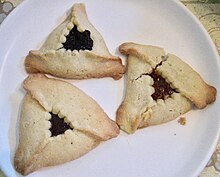Hamantash
A hamantash (or hamentasch, see: Other names; Yiddish המן־טאַש) is a filled-pocket cookie or pastry in Ashkenazi Jewish cuisine recognizable for its three-cornered shape. The shape is achieved by folding in the sides of a circular piece of dough, with a filling placed in the center. It is traditionally eaten during the Jewish holiday of Purim. While occasionally seen other times of year in secular contexts, this is not traditional. Hamantashen are made with many different fillings, including poppy seed (the oldest and most traditional variety),[1] prunes, nut, date, apricot, apple, fruit preserves, cherry, chocolate, dulce de leche, halva, or even caramel or cheese.[2] Their formation varies from hard pastry to soft doughy casings.
[edit] Other names
Hamantash is also known as hamentasch, homentash, homentasch, or even (h)umentash. The name "hamantash" (Yiddish: המן־טאַש), is commonly known as a reference to Haman, the villain of Purim, as described in the Book of Esther. The pastries are supposed to symbolize the defeated enemy of the Jewish people, and thus resemble the "ears of Haman".[3] “Naked Archaeologist” documentarian Simcha Jacobovici has shown the resemblance of hamantaschen to dice from the ancient Babylonian Royal Game of Ur, thus suggesting that the pastries are meant to symbolize the pyramidal shape of the dice cast by Haman in determining the day of destruction for the Jews.[4] Another possible source of the name is a folk etymology: the original Yiddish word מאָן־טאַשן (montashn) or German word mohntaschen, both meaning poppyseed-filled pouches,[5] was transformed to Hamantaschen, likely by association with Haman. In Israel, they are called Oznei Haman (Hebrew: אוזני המן), Hebrew for "Haman's ears" in reference to their defeated enemy's ears. Another folk story is that Haman wore a three-cornered hat ---thus the shape. Hamantashen can cause drug tests for opiates to show up positive if eaten in large amounts due to the amount of poppyseeds in them.
- Plural
The word "hamantash" is singular; "hamantashen" is plural and is the word form more commonly used. However, many people refer to these pastries as hamantashen even in the singular (for example, "I ate an apricot hamantashen").


{ 0 comments... Views All / Send Comment! }
Post a Comment